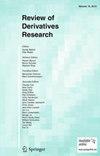移民还是不移民?监管SHO对期权交易活动的影响
IF 0.9
4区 经济学
Q4 BUSINESS, FINANCE
引用次数: 3
摘要
本文章由计算机程序翻译,如有差异,请以英文原文为准。
Migrate or not? The effects of regulation SHO on options trading activities
求助全文
通过发布文献求助,成功后即可免费获取论文全文。
去求助
来源期刊

Review of Derivatives Research
Multiple-
CiteScore
1.40
自引率
0.00%
发文量
8
期刊介绍:
The proliferation of derivative assets during the past two decades is unprecedented. With this growth in derivatives comes the need for financial institutions, institutional investors, and corporations to use sophisticated quantitative techniques to take full advantage of the spectrum of these new financial instruments. Academic research has significantly contributed to our understanding of derivative assets and markets. The growth of derivative asset markets has been accompanied by a commensurate growth in the volume of scientific research. The Review of Derivatives Research provides an international forum for researchers involved in the general areas of derivative assets. The Review publishes high-quality articles dealing with the pricing and hedging of derivative assets on any underlying asset (commodity, interest rate, currency, equity, real estate, traded or non-traded, etc.). Specific topics include but are not limited to: econometric analyses of derivative markets (efficiency, anomalies, performance, etc.) analysis of swap markets market microstructure and volatility issues regulatory and taxation issues credit risk new areas of applications such as corporate finance (capital budgeting, debt innovations), international trade (tariffs and quotas), banking and insurance (embedded options, asset-liability management) risk-sharing issues and the design of optimal derivative securities risk management, management and control valuation and analysis of the options embedded in capital projects valuation and hedging of exotic options new areas for further development (i.e. natural resources, environmental economics. The Review has a double-blind refereeing process. In contrast to the delays in the decision making and publication processes of many current journals, the Review will provide authors with an initial decision within nine weeks of receipt of the manuscript and a goal of publication within six months after acceptance. Finally, a section of the journal is available for rapid publication on `hot'' issues in the market, small technical pieces, and timely essays related to pending legislation and policy. Officially cited as: Rev Deriv Res
 求助内容:
求助内容: 应助结果提醒方式:
应助结果提醒方式:


